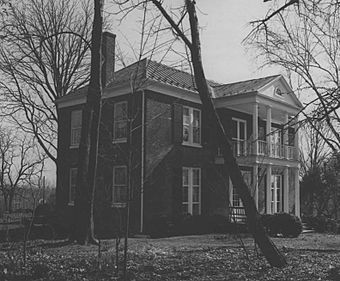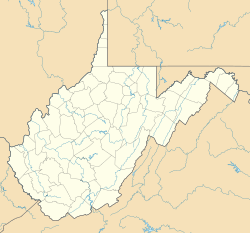Morgan-Bedinger-Dandridge House facts for kids
Quick facts for kids |
|
|
Morgan--Bedinger--Dandridge House
|
|
|
U.S. Historic district
Contributing property |
|
 |
|
| Nearest city | Shepherdstown, West Virginia |
|---|---|
| Architectural style | Classical Revival, Georgian |
| NRHP reference No. | 83003239 |
| Added to NRHP | May 13, 1983 |
The Morgan-Bedinger-Dandridge House is a historic home near Shepherdstown, West Virginia. It's also known by its older names, Poplar Grove and Rosebrake. This house is part of a special area called the Morgan's Grove rural historic district.
Contents
A House with a Long History
Early Beginnings (1745)
The very first part of this house was built around 1745. A settler named Richard Morgan built what was called the "Back Building." Later, in 1803, Daniel Morgan added a bigger, two-story brick part. This new section was known as the "Great House." Beautiful gardens were also created around the house at this time.
Changes Over Time (1859)
In 1859, the main part of the house you see today was built. Caroline Bedinger, whose husband Henry Bedinger had passed away, oversaw this construction. During her time, a well-known person lived there: Colonel Alexander Boteler. He was a former U.S. Representative, meaning he helped make laws for the country.
When the American Civil War began, Colonel Boteler became an officer for the Confederate side. After the war ended, while he was still living at Poplar Grove, President Ulysses S. Grant chose him for an important group called the U.S. Centennial Commission. This group helped plan the 100th birthday celebration of the United States.
A New Name: Rosebrake (1877)
Caroline's daughter, Danske Dandridge, was a famous poet. In 1877, she decided to change the house's name to "Rosebrake." Sometimes it was spelled "Rose Brake."
Adding a Portico (1950)
Much later, in 1950, a large porch with columns, called a portico, was added to the house. This portico actually came from another house all the way from Long Island and was brought to West Virginia.
 | John T. Biggers |
 | Thomas Blackshear |
 | Mark Bradford |
 | Beverly Buchanan |



